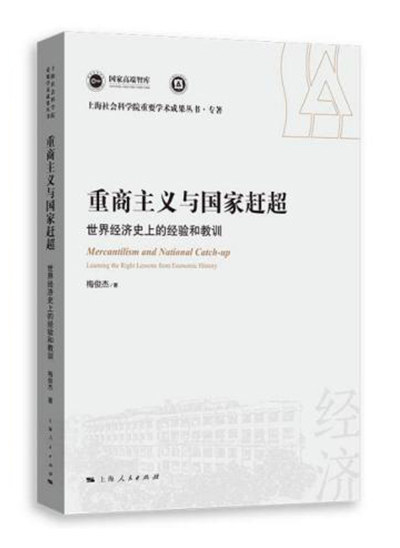The role of mercantilism in national catch-up

Mercantilism and National Catch-up: Learning the Right
In conventional thinking, the irrational “interference” stance of mercantilism obstructs the effective allocation of various production factors, while the “invisible hand” advocated by the laissez-faire school is regarded as a rational behavior pattern that can maximize the interests of all parties. The theoretical propositions and practical effects of these two are widely divergent. This stereotypical and labeled narrative has not only profoundly influenced the understanding of mercantilism and the liberal school, but also subtly dominated the understanding of world development in modern times. Mercantilism and National Catch-up: Learning the Right Lessons from Economic History, by Mei Junjie, a research fellow from the Shanghai Academy of Social Science, reveals the theoretical connotation of mercantilism and its core role in the historical process of modern national catch-up development, refreshing the stereotype of mercantilism and the liberal school in the previous mainstream economic history discourse.
Following the emergence of modern nation-states, mercantilism and free trade were put into practice throughout different historical stages. However, it is common to imagine that some countries pioneered the transition from traditional agrarian societies to modern industrial societies by abandoning mercantilism and relying on free trade. This view tends to oversimplify history by dichotomizing it into two distinct periods, overlooking the fact that mercantilism serves as the cornerstone of all successful capitalist countries. Those countries that have adopted free trade have in fact adopted mercantilism in pursuit of national prosperity and catch-up for a long historical period, only later becoming eligible for trade liberalization.
This is evident in the historical development of countries such as the Netherlands, the United Kingdom, France, and Germany. As the “first modern economy,” the Netherlands reached peak hegemony in the mid-17th century, actively pursued free trade, and took the lead in the process of world modernization. Before advocating free trade, the Netherlands actually implemented high tariffs for an extended period. Through measures such as military protection, authorizing monopolies, supporting industries, and preventing the outflow of production factors at the national level, the Netherlands gradually rose to prominence.
Through delving into the historical experiences of Europe, Dieter Senghaas, founder of “critical development theory,” argued that due to various historical reasons, countries are out of step in terms of development. There exists an international power gap between pioneers and latecomers. International free trade has become a tool for stronger nations to engage in “exclusionary competition” with the weak, thus creating a kind of “marginalizing pressure” that drags the weak into the “marginal” track. This results in weaker nations becoming dependent on stronger ones, solidifying and exacerbating the disparities between them. In this view, the ultimate essence of free trade is to serve the actual needs of the internal development and prosperity of nation-states, which can be interpreted as a kind of refined mercantilism. Therefore, it is not difficult to explain the mercantilist motives of Josiah Tucker, Robert Torrens, and Edward Wakefield in advocating free trade.
Geng Yong is an associate professor from the Zhejiang Provincial Academy of Socialism.
Edited by YANG LANLAN
